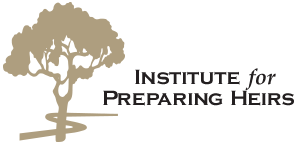Family Meetings About Wealth and Wealth Transfer

Should financial advisors lead the meetings, suggest a skilled facilitator or leave it up to the family?
Meeting as a family to talk about the meaning and purpose for family wealth is a wonderful way for families to grow closer and prepare for wealth transfer. For financial advisors, suggesting family meeting topics is a sophisticated strategy to learning more about, and creating opportunities to connect with, the entire client family. In fact, studies show that advisors who connect with the heirs, including spouses, are more likely to be retained post-inheritance.
Many wealth-related topics can be led by a family member, such as the family legacy story—who, and how, the family wealth and/or business was created.
There also are topics that families would benefit from the leadership and expertise of their financial advisors. A few include:
• What the family’s estate plan includes and the planning process
• What estate roles are available for family members and the responsibilities of each role
• How to get the most from the advisor/client relationship
The focus of these meetings is not about “how much and when,” but rather, how family members can become involved in the estate planning process and decision making. Here, the advisor has the opportunity to connect with the inheriting generations and explain what the advisor does for the family today, and in the future.
While the majority of financial advisors are highly skilled at managing their clients’ money, many advisors are not as comfortable when engaging clients on soft-side issues that directly impact the future success of their children. All advisors would benefit from intergenerational wealth transfer training and tools. Click here to find out more about our next training session for advisors.
When to Refer a Skilled Family Meeting Facilitator
While not all families will ask, advisors need to be prepared to refer families to skilled meeting facilitators or family coaches when unresolved issues among family members threaten to derail the family’s ability to move forward as a cohesive family unit, putting a successful wealth transfer at risk.
Keep in mind that it’s not the role of the financial advisor to “fix the kids.” Let a skilled family meeting facilitator or family coach help the family resolve potentially obstructive family relationships.
Amy Castoro, senior family coach with The Williams Group, suggests advisors look for facilitators who will partner with the advisor to help ensure the family achieves its short- and long-term financial and non-financial outcomes. “A neutral outside perspective helps identify issues, develops a strong foundation of shared purpose and builds trusting relationships.”
Castoro offered the following checklist advisors can use to identify client families potentially at risk for a successful wealth transfer:
• Family leaders have concerns about the next generation’s level of preparedness to receive wealth or their attitudes about it
• The family is “stuck” and unable to make decisions that have stalled the estate planning process
• The family is not sure how to start the conversations about wealth transition
• A significant life event has occurred (change in leadership, marriage or death) that could have an impact on successful wealth transition and relationships
• There is a lack of clarity regarding the succession plans for the family business
• Family members’ different interpretations for the use and purpose of wealth are creating tension
• Family values have not been identified and aligned
• Some family members regularly fail to appear for important family meetings
Clients will appreciate knowing their financial advisor can offer tools and resources to bring the family closer together before wealth transfer.

